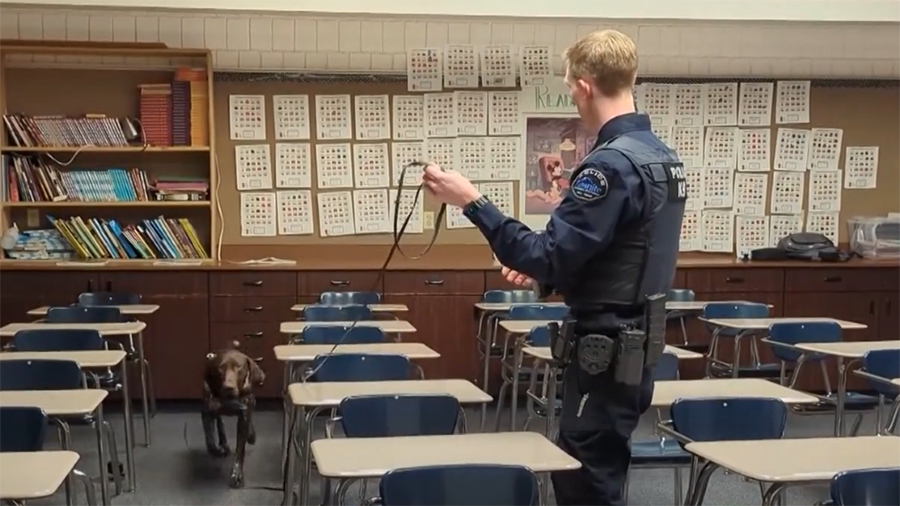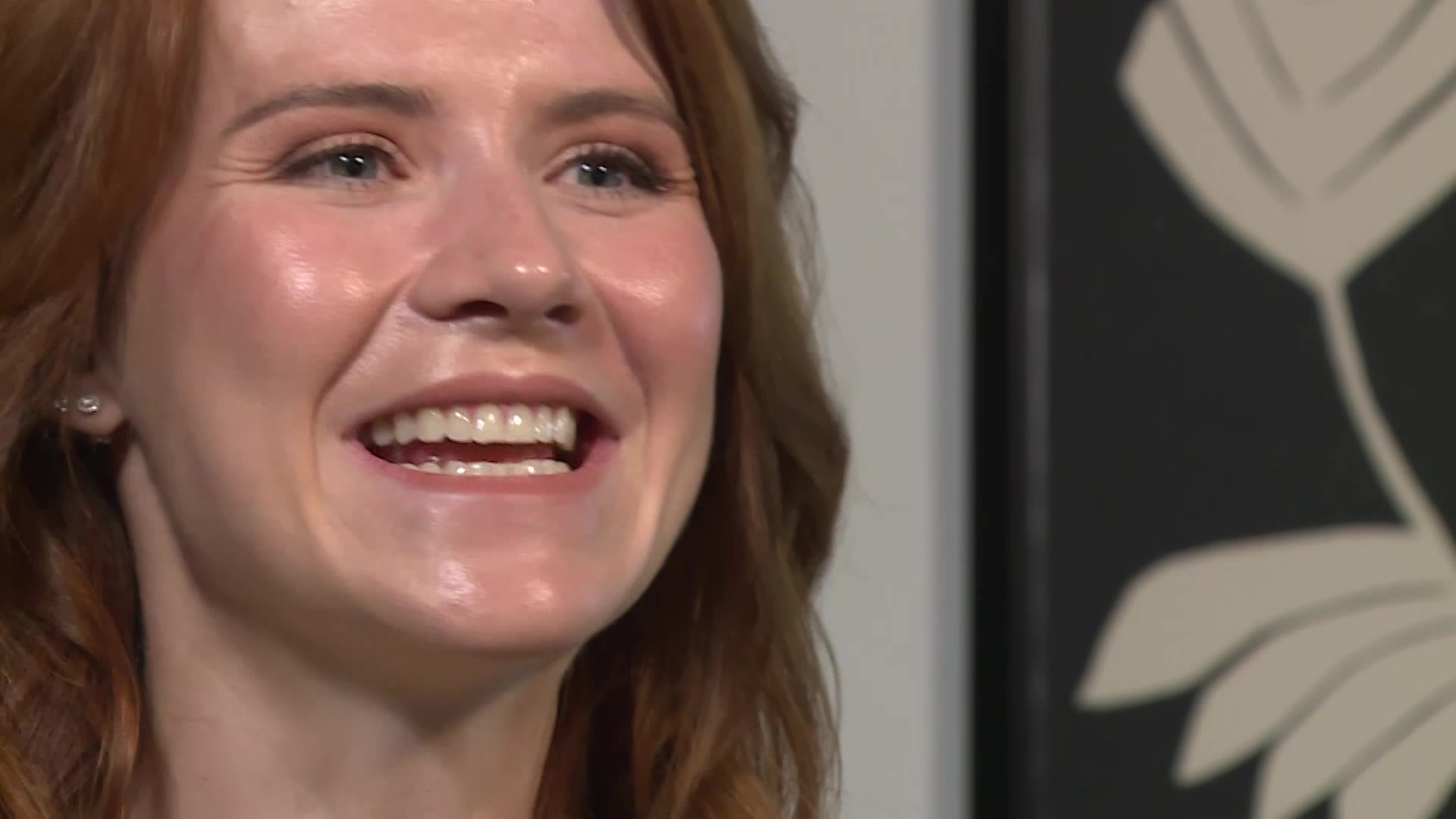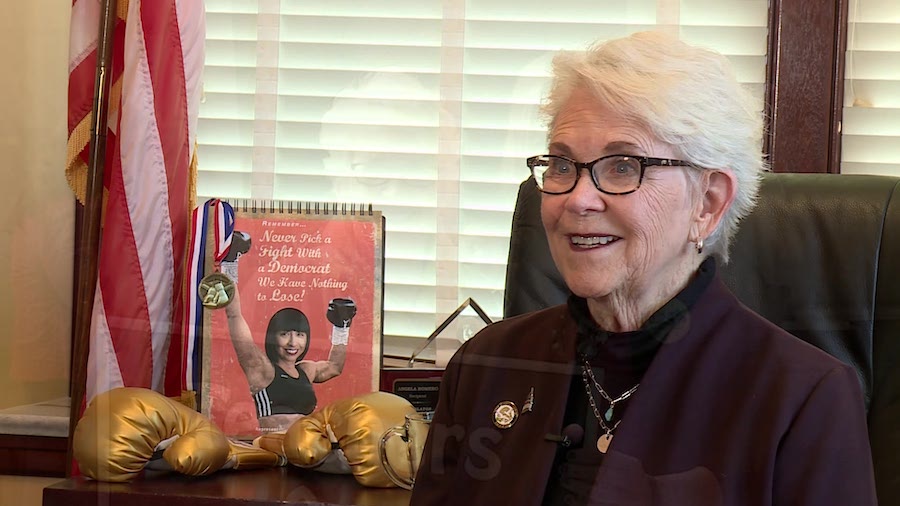KSL+: Research Shows Frontline Medical Workers Struggling With Mental Health, Burnout
Feb 25, 2021, 7:00 PM | Updated: Jun 29, 2021, 4:04 pm
Matt Rascon: Hey, welcome back to KSL+. This is the digital only news cast designed to dive deeper into the stories impacting us right now. I’m Matt Rascon. We had to take a bit of a hiatus because of COVID. But we’re back in a more simplified format. As you can see, KSL+ will be available on the KSL-TV app on Thursdays.
You see a lot of news every day on KSL-TV, you read it on Desert News, KSL.com, KSL News Radio. And the idea on this show is to just take one topic, and then break it down. We’re all about helping you understand, trying to inform you so you can make good decisions for you and your family.
I want to kick off here with a sensitive subject. This is actually a story I covered earlier this month. And one that’s been sort of hidden behind the daily case counts we report each day. So I only had a minute and a half to share the story of Dr. Cesar Briganti. And really, it’s something that deserves much more. Earlier this month, Dr. Cesar Briganti died by suicide.
Dr. Adam Balls, Riverton Hospital: I would describe it as tragic and unfortunate.
Matt: After a years-long struggle with his mental health that friends and family say was just exacerbated during the pandemic.
Dr. Balls: It’s okay to struggle. That’s part of our line of work. That’s, that’s being human.
Matt: Friends, colleagues and family gathered at Riverton hospital to remember him.
Dr. Balls: Caring deeply about what you do and taking care of COVID patience as Cesar did–and having that kind of beat you up–is part of the challenge that we’ve dealt with in the pandemic over the last 11 months. That really took its toll on Cesar. He devoted his whole soul and all of his energy to taking care of those patients.
Matt: Cesar was originally from Spain. He studied at BYU, he went out of state for medical school. He returned to do his residency at the University of Utah and then helped open Riverton hospital as its first hospitalist.
Yolanda Briganti, ex-wife of Dr. Cesar Briganti: He is the best physician around and he spent a lot of time even when he was sleeping. He was he would wake up and ‘Oh, I know what to do with this patient.’ He would call the nurses in the middle of the night. ‘Oh, give him this, give him that. I just figured out what to do.’
Matt: Cesar and his wife, Yolanda, were married for 21 years, they have five children. Less than a year ago, they divorced, but remained close. And Yolanda was there for the vigil. She spoke:
Yolanda: You can’t fix something that you can’t talk about.
Matt: This death, of course, had been so hard on her…
Yolanda: We can talk about it.
Matt: And hard on her children. But she’s decided to speak up about his death. And we spoke to her a few days ago. She doesn’t want to see it happen to another healthcare worker, or anyone for that matter.
Yolanda: I think that the biggest thing that we can do is…I really don’t know. I feel like I–of everybody, I should have been able to stop this from happening. But I couldn’t because he wouldn’t let me. He wouldn’t let anybody help him. And he wouldn’t, he wouldn’t let people know that he was hurting this much. And so I don’t know how I can help other people understand like, it’s okay to not be feeling well. And to seek help and to say, ‘I’m not doing well, I need some help.’ I don’t know how I can say that more than it’s, really, it’s okay to not be okay.
Matt: Research published by the University of Utah just last month found that Dr. Briganti is not alone here. According to their research, 56% of frontline medical workers, that’s fire, that’s EMT, that’s police, hospital, doctors, nurses, screened positive for at least one mental health disorder. Problematic alcohol use, insomnia, and depression, all top the list.
The big word that surrounds all of this is kind of burnout.
Matt: This isn’t a problem that started with the pandemic of course, and it’s not going away either. So we’ve heard from health care workers throughout the pandemic that this has just tired them out.
Heidi Vawdrey, nurse practitioner, friend and colleague of Dr. Briganti: So we have to acknowledge as a whole with society, that trauma takes its toll. And we have to actively combat that.
Matt: I had a chance to sit down with nurse practitioner, Heidi Vawdrey. She is a friend and former coworker of Cesar. And someone who in recent years has really dedicated herself to talking about mental health and trying to help people get the help they need. And here’s our conversation.
Heidi: I’m very bold about asking my patients, ‘I see here you marked on your depression screen or that you’re having some thoughts of dying. Let’s talk about the little bit more. Are these passive thoughts of dying? Are these active thoughts? Do you have a plan? What does that plan look like?’ And it’s very uncomfortable even for trained clinicians with experience to ask those questions of their patients, much less of their co-workers and the people around them. And that’s something that I’m really fighting actively to change. And now that I’ve been teaching at the University of Utah for a year and a half or so, this is my second round now of teaching a batch of nurse practitioner students, this QPR curriculum that I think is so important,
Matt: Maybe you can briefly summarize what is QPR?
Heidi: QPR stands for question, persuade and refer. It’s an hour to an hour and a half long class that teaches people how to identify warning signs of suicide. And then what to do when you recognize those signs. Because I think a lot of us see someone that’s in distress, and then you’re kind of panicky, like, ‘I don’t really know what to do with this information. I’m scared to ask these questions.’ Because then what if they say yes, that they are thinking of hurting themselves, then what? That’s really scary for a lot of people. And so QPR teaches people how to ask the right questions. And I have a colleague who always told me, ‘if you want a direct answer, you have to ask a direct question.’ Because if you just ask someone, ‘how are you doing?’ ‘I’m doing fine.’ Okay, that’s a completely garbage question and a completely garbage answer. But if you say to someone, say, ‘Hey, I noticed you seem kind of down lately, and you’ve been a little bit more withdrawn and spending more time in your office instead of out with us at the nurse’s station, tell me what’s going on.’ That acknowledges to the person you have observed something that concerns you, and you care enough about it, that you’re willing to actually ask a question with a response that might feel uncomfortable. So once they say, ‘Yes, I have been thinking about this’, then the next thing is to assure them that you’re not going anywhere, that you’re there to help and support them, that you care about them. Because when people are in this really low dopamine state of depression, they lose some of their perception of reality. They feel like everything’s awful, it’s never going to get better. I’m a bad person, I don’t see a way out of this. And they need someone to throw them that lifeline and to show them the light and the way out, and to assure them that they won’t be alone. And it can be difficult to persuade people to receive help.
Cesar was an example of that. Several times I reached out to him, ‘Hey, I’m just a little worried about you. How are things going?’ ‘I’m fine, I’m fine’. He put up walls. And because I was no longer working with him, I didn’t have the ability to see him and snag him in person. And kind of pin him down for more difficult conversation. But something I’ve learned in being a nurse practitioner is that a very significant number of the patients that I encounter, have at least passive thoughts of dying. These are really common. And that’s the first thing that I tell them, like, ‘I’m sorry, you’re feeling that way. I want you to know that a lot of people feel this way. And it’s possible for you to feel better, and work on this together’. And it’s a big relief for people to unburden those thoughts, and to share with someone else, you know, this deep, dark secret they’ve been holding. And then we work on a plan together to keep them safe. The refer part of QPR for someone that’s just out in the community involves teaching them about resources. We have like the Mobile Crisis Outreach team through UNI, or the SafeUT app that you can text or call anytime of the day or night and that goes to a suicide helpline, or that there’s a Behavioral Access Center at LDS Hospital and at Dixie Regional Hospital and at McKay-Dee Hospital, where people can go in and self-refer with these issues. That’s for kind of more urgent things or helping people understand when it’s appropriate to call 911 if they’re really afraid that someone’s a danger to themselves or others. And this is not something that you can just text us a safe line, you know that this is a situation where 911 is appropriate so that they can come and evaluate them. The further I’ve gotten in medicine–and I would say especially in the last year, as the pandemic stress has just clobbered everyone collectively and especially health care providers–I’m seeing an extreme escalation of the severity of mental health symptoms across the board and especially in my health care workers. So part of my practice strategy is to screen extensively for mental health symptoms. People that come into my clinic always get screened for anxiety and depression. Even if they’re coming to establish care for their toenail fungus. They’re going to get screened for anxiety and depression.
Matt: And you have therapists?
Heidi: We do have therapists in house regarding health care providers. I had a conversation with nurses right before I left bedside–middle of the night is when you have these good conversations. We were talking just about the strain and stress of being a nurse and kind of telling war stories. ‘Now you remember that patient that choked me and the one that kicked me across the room and that really bad code where that person bled out’ and the kind of cultural expectation in medicine is that you’re just going to suck that stuff up, that this is part of your job. You signed up to be a nurse, you signed up to be a doctor, you expect to be kind of bathing in this trauma. And there’s always been EAP, employee assistance programs, those kinds of things, but they’re off-site. And one night asked my coworkers, how many of you have ever felt really depressed or even suicidal, and several of them expressed that at some point in their life, whether it was career related or postpartum depression or, you know, whatever situation in their life, that also impacts their ability to function at work, that they had felt suicidal, and I said, ‘How many of you have ever actually sought counseling for that?’ One. One person had sought counseling. I was in that same camp. And it wasn’t until I was seven semesters into my doctoral program that I finally hit the wall and thought, you know, there’s a lot of garbage that I need to process. Both difficult things I’ve been through personally– death of my baby, death of my sister–but then also this accumulated career trauma that I need to stay on top of. In order for me to be a good clinician, and to be present and available emotionally for my patients, I have to make a very concerted effort. And that includes going to therapy regularly to process the garbage that comes up because there’s this repetitive trauma that comes in medicine. And I think this year has just 100 times that for our people that are working at bedside and seeing death in a way that they’ve never seen before. And complications in a dizzying array of symptoms that are so challenging. This virus is unlike anything we’ve ever seen. There’s not predictable course for anyone. And the shortages of PPE and long hours. The providers themselves getting sick and having these after effects and feeling like they have to go back to work maybe sooner than they’re able. And maybe they have some brain inflammation that’s making it difficult for them to function. But they have to go back to work.
Matt: I’m going to throw out this, this statistic from the American Psychiatric Association, in 2018 saying that physicians–that profession–had a higher rate of suicide than any other profession in the US, I think had mentioned, 300 to 400 a year was kind of the estimation.
Heidi: It’s like double the national rate. It’s not just high, it’s double. And it’s the highest rate of suicide in any profession. And there’s so many reasons why. One of the things that I find really challenging is that many of the medical boards ask very invasive questions of their applicants. And I understand the reasoning behind this. We want to have safe clinicians out there, we want to make sure that there’s someone who’s not, you know, completely delusional, that’s practicing medicine. But these questions are targeted, some of them are really specific. Have you taken any medications for mental health in the last two years? So someone who’s taken 50 milligrams of Zoloft for some postpartum depression or situational depression after a series of really difficult things, or this repetitive trauma, can be penalized. And I spoke to a physician who had told me that when she was in residency, there were many people in her residency program that would drive to the next state over because they were close to the border, in order to get anonymous care under pseudonyms, to get prescriptions because they were so afraid of the repercussions of being found out that they were on medication. And she said herself, said I had postpartum depression with my first kid. And I knew that I’d probably have was my second because I grew up, there’s a lot of pressure in my family, we talked about this, I never thought it was a problem until I went to med school. She said I purposely did not take any medications after that second birth, because I knew I would be asked on my fellowship applications, whether or not I had taken medications within five years. And I didn’t want that to delay any of my applications to be able to go on and do residency and fellowship. So she said it was really rough, we suffered through it. This is where the physicians legitimately have a lot of fear, whether that same level of punitive stuff is the same here in Utah or not. Culturally, for physicians, there’s an awful lot of you have to hide this, you have to suck it up. Part of being a doctor is just embracing that this is extraordinarily stressful, and can be hurtful.
Matt: So you have on one hand trauma that, you know, doctors, physicians nurses experience on a daily basis when they’re at work, right. You know, which takes its toll. And then on the other hand, this fear at least for some who don’t feel like they can really seek help what is the antidote?
Heidi: There needs to be a cultural shift, and I think this is kind of medicine wide, but I think it’s even more focused on physicians. And one of the things that I’m hoping that my colleagues at Riverton hospital will take away from this–I still feel like kinship to that unit, that’s where I was for seven years and I have many good friends who work there–is just this example of you actually could and should use EAP. You should go get counseling, it is confidential. It’s provided, it’s paid for by the employer, but it’s confidential. The therapist can’t divulge things that happened there and have people tell me all the time, I don’t know what I’d say in therapy. Like, I don’t think I really need therapy. I’m pretty okay today. But I guarantee you that if you sit down any person who’s worked in healthcare, that if they sit down, start talking to a therapist, there’s an awful lot of trauma that’s been just packed down and repressed, that you’ve been just swallowing. Suicide is considered one of the most preventable types of death. And the more people we have trained in the community who understand these concepts of QPR, it’s just like if you train enough people in CPR–20% of population knows CPR–then the mortality rates from cardiac arrest go down. The more people in the community we train with QPR, and embolden people to ask those difficult questions, ask the direct questions, they can get the direct answer, the more of these lives that we can save. I personally feel like anyone who’s in medicine should just plan on going to a therapist a couple times a year for a tune up, like you go rotate your tires every four or 5000 miles, right, change your oil. This is preventative maintenance. So even if you don’t feel like this is a real crisis–because the problem is when you hit a real crisis, then you go into therapy, and then you’re like, I don’t even know where to start. But if you’ve been talking to a therapist and learn some strategies for self-care, and for mindfulness and some insight into how your body is reacting and feeling things that feel uncomfortable, then all of those things– those tools when you need them, when there’s a bad code, when your 10th COVID patient dies, when you’re on your eighth shift, and you just don’t feel like you can do it anymore–preemptively doing some counseling, builds resilience, and reduces burnout. And cookies are nice. So are billboards. But what we really need are things that actually build our resilience.
Matt: This topic, of course, is a difficult one we all, you know, we often avoided it sounds like in, in healthcare. And even in the news, you know, we typically don’t even cover, suicide for different reasons. But specifically for Cesar. I mean, the message that we got from you, from other colleagues, and from what you were telling us from the family, was that they wanted to talk about this. They didn’t want his death to just be swept under the rug,
Heidi: It’s one of the biggest disservices that we can do–is to sweep it under the rug, because it’s the thing that’s killing our physicians. You know, why, why would we ignore this? Or pretend it didn’t happen? Why is this embarrassing? Why is it difficult to talk about mental health, it’s a chemical imbalance in your brain. You know, there’s a lot of other factors that go into it besides that, but this is something that I’ve just found myself unwittingly becoming like an evangelist about. And I’ve been asked to speak at many congregations and various groups and stuff over the last few years, because people are hungry for knowledge and for understanding of how their body and their mind work together. And what mental health symptoms actually are, it’s not just being sad or down, it can be all these other physical symptoms that can be sleep disturbances, changes in your weight, problems with concentration, anger, irritability, a whole bunch of other things. And people want to know how to help themselves and how to help their family members. And so that’s what we need to be doing is focusing on education, that’s prevention. But specifically to medical providers, we have to acknowledge that this is something that’s rampant. And it’s not going away. The stresses of being a provider, of being a nurse, any of those roles are immense. And we are not meant to experience that in isolation and just hold it inside it will destroy you.
Matt: Someone listening or watching has had some thoughts, or maybe they have family members, who have had thoughts like this. What’s your message to them?
Heidi: My message is that if you want that direct answer, you have to ask a direct question. One of the most important things friends and family can do is recognize that when people are in a deeply depressed state, they lose the ability to do some of those kind of basic care things for themselves. They have a hard time taking care of feeding themselves. And that was something that we noticed was Cesar–he was losing a lot of weight, he was having a hard time taking care of himself at home. They have a hard time with executive function things like when you’re saying you should go see your primary care provider about your depression. The act of picking up a phone and scheduling an appointment feels immense, insurmountable. Go find yourself a counselor. That feels terrifying to call someone up and say, ‘Oh my gosh, I’m depressed. I think I need to talk to someone.’ But that’s something that a family or friend can take off their plate. I’m really worried about you. Can I call and schedule make an appointment for you? Can I come with you to that appointment and make sure that you have the support that you need? That’s something you can do.
Matt: We appreciate nurse practitioner, Heidi Vawdrey, Yolanda and others for talking with us, for sharing their story, for helping us out today. And for those who are struggling with mental health, for those who are experiencing suicidal thoughts, we would add our voices and encourage you to get help. You have resources. The SafeUT app, of course, and then the national suicide hotline, that’s 800-273-8255. We would urge you to get that help that you need. And we will be back next week with another topic. Thanks a lot for joining us.













